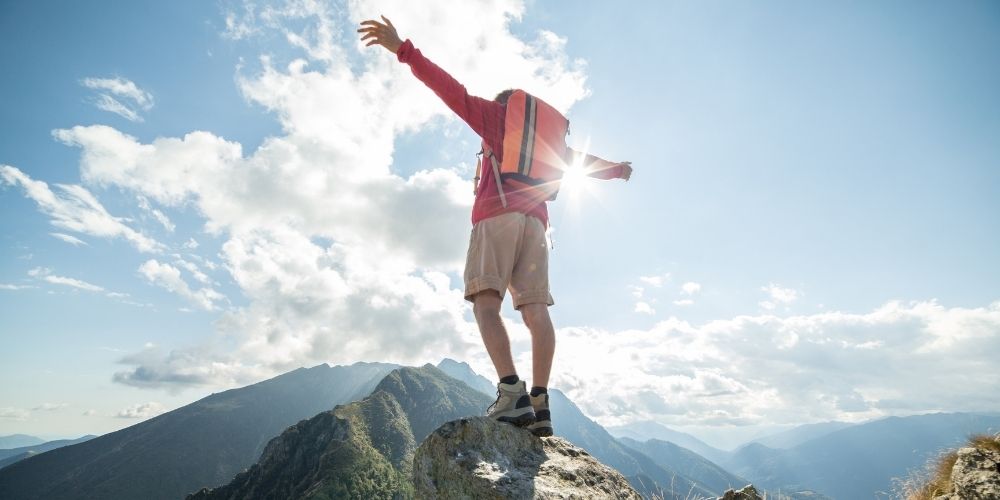
When visiting high altitude places such as Colorado and Utah, the air is thinner and its harder to breathe. Traveling to high altitudes can be quite the adventure. However, altitude sickness is no joke! You feel less energy, exhaustion, nausea, headache and numerous other symptoms because your body finds it difficult to adapt to that environment.
Many travelers will take high altitude pills or some kind of acclimatization supplement to prevent and avoid the altitude sickness you could experience. Here you will learn about high altitude sickness and what to look for when shopping for high altitude pills.

Altitude sickness (also called acute mountain sickness AMS) stems from the effects of exposure to high altitudes on human physiology. It usually occurs above 8,000 feet, but it can start at altitudes as low as 5,000 feet in places like our hometown of Denver, Colorado.
High altitude sickness is defined usually as a result of the lack of oxygen in the air and changes in barometric pressure.The higher you go in altitude, the lower the oxygen levels. The human body needs a certain level of oxygen to function properly. This means that in higher altitudes more effort is needed to perform even simple tasks.
Symptoms tend to develop within 6 to 24 hours after arrival at altitude but may take longer in others depending on various factors of health, age, weight, and even prior high altitude exposure and experience. Mild forms of altitude sickness often occur during ascent or descent, however beware that moderate and severe forms can also occur if at longer durations in high altitude conditions.
The most common symptom of altitude sickness is headache, which can be severe.
Other mild to moderate symptoms may include:
Having the right supplement goes a long way in helping your body feel better while you’re at high altitude. There's natural high altitude pills that you can take to avoid altitude sickness or have an easier time.
They typically work by helping the body:
There are several things to look for when trying to find the best high altitude pill, we'll cover further below.
No matter the brand you pick, you typically want to start taking altitude supplements 1-2 days before your trip of encountering high altitudes. This helps prepare you body beforehand, and then you will take the supplement's recommend dosage daily while at high attitudes. Sometimes taking a little extra (if an option with the supplement), can help the first few days of your trip or if you start to feel any altitude symptoms.

These are key things to look for in high altitude supplements to maximize getting the best results.
Research has shown that sugar can cause blood sugar levels to fluctuate. This is because when you consume sugar it causes a quick spike in your glucose levels, which can then plummet. In turn, this will make you feel fatigued, moody and even having headaches.
Sugar can also negatively impact your immune system. A study published showed that eating sugar slows the functioning of white blood cells and hinders the immune system. Even further, after the immediate consumption of a lot of sugar, it can take 5 hours for the immune system to respond.
This is why you want to seek out sugar-free products, or at minimum zero "added sugar" altitude pills.
Are you looking for an easy-to-use high altitude supplement? Loaded with glutamine and glutathione, try our sugar-free Recovery Chewables!
SOURCES:
1. Role of sugars in human neutrophilic phagocytosis
https://academic.oup.com/ajcn/article-abstract/26/11/1180/4732762
2. A high-sugar diet affects cellular and humoral immune responses in Drosophila
https://pubmed.ncbi.nlm.nih.gov/29727694/
3. Doctors warn that sugar can temporarily weaken your immune system
https://www.cnet.com/health/nutrition/sugar-can-lower-your-immune-system/
4. Acute mountain sickness; prophylactic benefits of antioxidant vitamin supplementation at high altitude
https://pubmed.ncbi.nlm.nih.gov/11252695/
5. Acute Mountain Sickness
https://www.wnyurology.com/content.aspx?chunkiid=21435
6. Study Shows Taking Sustamine® L-Alanyl-L-Glutamine During Strenuous Exercise May Ward Off Exhaustion Longer
https://kyowa-usa.com/news/2015/study-shows-taking-sustamine-l-alanyl-l-glutamine-during-exercise-may-ward-off-exhaustion
7. Effects of l-Alanyl-l-Glutamine Ingestion on One-Hour Run Performance
https://www.tandfonline.com/doi/full/10.1080/07315724.2015.1009193
8. Glutathione metabolism under high-altitude stress and effect of antioxidant supplementation
https://pubmed.ncbi.nlm.nih.gov/19070306/
9. Ibuprofen decreases likelihood of altitude sickness, researchers find
https://med.stanford.edu/news/all-news/2012/03/ibuprofen-decreases-likelihood-of-altitude-sickness-researchers-find.html
10. High Altitude Got You Down? Try Ibuprofen
https://www.npr.org/sections/health-shots/2012/03/21/149064059/high-altitude-got-you-down-try-ibuprofen
11. Ibuprofen Prevents Altitude Illness: A Randomized Controlled Trial for Prevention of Altitude Illness With Nonsteroidal Anti-inflammatories
https://www.annemergmed.com/article/S0196-0644(12)00090-X/fulltext
Copy the coupon code & use it at checkout